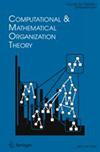战略、意向性和成功:解释战略行动的四个逻辑
IF 1.5
4区 管理学
Q3 COMPUTER SCIENCE, INTERDISCIPLINARY APPLICATIONS
Computational and Mathematical Organization Theory
Pub Date : 2023-07-01
DOI:10.1177/26317877231186436
引用次数: 0
摘要
战略成功通常与深思熟虑的意图、事先确定的目标和全面制定的有效执行计划有关。这种思维方式是由一种手段-目的逻辑驱动的,并以认知主义假设为基础,即有意识的思考和结果推理驱动有效的行动:这种思想高于行动的特权在战略理论化中是特有的。我们在本文中的目的是证明战略行动和“意图”的其他前认知逻辑作为战略成功的替代解释基础的合理性。我们确定了三种这样的逻辑和它们相关的意向性形式。“实践逻辑”将集体共有的习惯视为有效战略行动的基础,而不是有意识的认知/刻意的意图。“情境逻辑”强调情境动量、倾向和启示本身如何包含主动引出适当战略反应的前认知“紧张”冲动。最后,“潜力逻辑”与弗里德里希·尼采所说的“权力意志”有关。我们认为,正是有了这第四种逻辑,战略意图才会变得最有效。在权力意志中,战略要求不断扩大不受环境约束的自由程度,而不假定与环境的认知分离。本文章由计算机程序翻译,如有差异,请以英文原文为准。
Strategy, Intentionality and Success: Four Logics for Explaining Strategic Action
Strategic success is usually associated with having deliberate intentions, prior stated goals and a comprehensively formulated plan for effective execution. This way of thinking is driven by a means–ends logic and underpinned by the cognitivist assumption that conscious thought and consequential reasoning drive effective action: such privileging of thought over action is endemic in strategic theorizing. Our purpose in this paper is to demonstrate the plausibility of other, pre-cognitive logics of strategic action and ‘intention’ as alternative explanatory bases for strategic success. We identify three such logics and their associated forms of intentionality. A ‘logic of practices’ views collectively shared habitus rather than conscious cognition/deliberate intention as the basis of effective strategic action. A ‘logic of situation’ emphasizes how situational momentum, tendencies and affordances themselves contain pre-cognitive ‘in-tensional’ impulses that actively elicit appropriate strategic responses. Finally, a ‘logic of potential’ associated with what Friedrich Nietzsche termed ‘will to power’. It is with this fourth logic, we suggest, that strategic intention becomes most effective. In will to power, strategy entails the relentless expanding of degrees of freedom from environmental constraints without presuming cognitive separation from it.
求助全文
通过发布文献求助,成功后即可免费获取论文全文。
去求助
来源期刊

Computational and Mathematical Organization Theory
COMPUTER SCIENCE, INTERDISCIPLINARY APPLICATIONS-MATHEMATICS, INTERDISCIPLINARY APPLICATIONS
CiteScore
3.80
自引率
16.70%
发文量
14
审稿时长
>12 weeks
期刊介绍:
Computational and Mathematical Organization Theory provides an international forum for interdisciplinary research that combines computation, organizations and society. The goal is to advance the state of science in formal reasoning, analysis, and system building drawing on and encouraging advances in areas at the confluence of social networks, artificial intelligence, complexity, machine learning, sociology, business, political science, economics, and operations research. The papers in this journal will lead to the development of newtheories that explain and predict the behaviour of complex adaptive systems, new computational models and technologies that are responsible to society, business, policy, and law, new methods for integrating data, computational models, analysis and visualization techniques.
Various types of papers and underlying research are welcome. Papers presenting, validating, or applying models and/or computational techniques, new algorithms, dynamic metrics for networks and complex systems and papers comparing, contrasting and docking computational models are strongly encouraged. Both applied and theoretical work is strongly encouraged. The editors encourage theoretical research on fundamental principles of social behaviour such as coordination, cooperation, evolution, and destabilization. The editors encourage applied research representing actual organizational or policy problems that can be addressed using computational tools. Work related to fundamental concepts, corporate, military or intelligence issues are welcome.
 求助内容:
求助内容: 应助结果提醒方式:
应助结果提醒方式:


